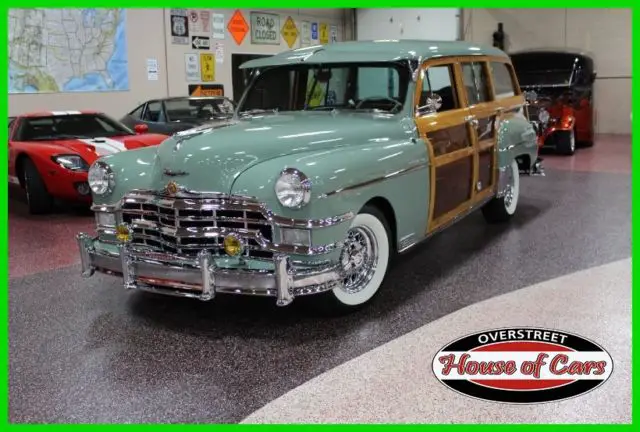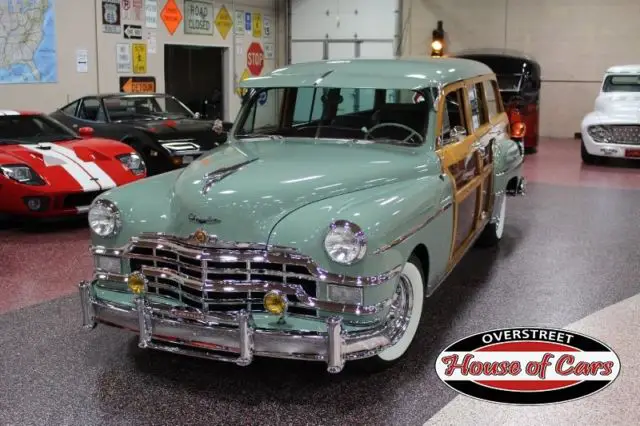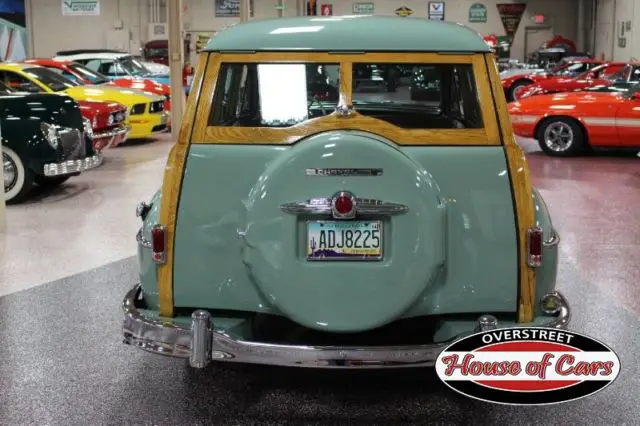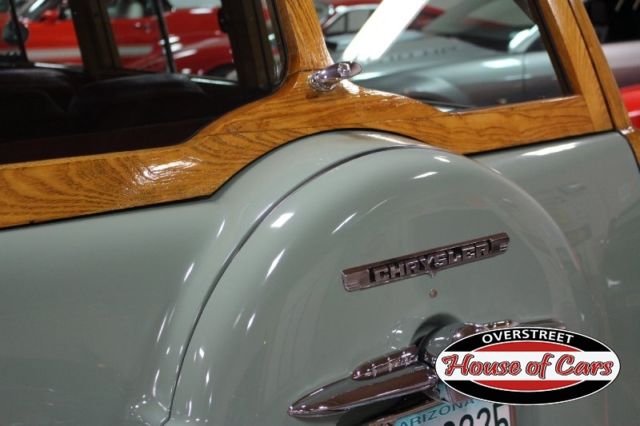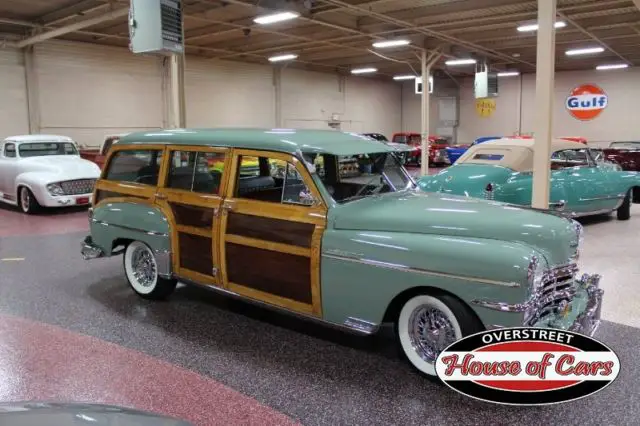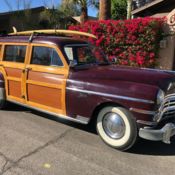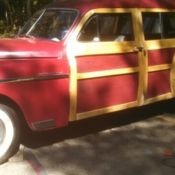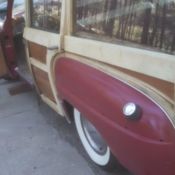1949 CHRYSLER ROYAL WOODIE WAGON
1949 Chrysler Royal Woodie Wagon WOODIE WAGON
One of Just 850 Examples Produced for 1949
Just Two Owners from New
Meticulously Restored
Rebuilt Original Engine and Fluid Drive Transmission
Thoroughly Rebuilt Underpinnings
Equipped with Wire Wheels and Period Features
Goodguys Fall Del Mar Nationals Award Winner
Technical Specs:
251 CID L-Head Inline 6-Cylinder Engine
Dual Carter 2-Barrel Downdraft Carburetors
116 BHP at 3,600 RPM
3-Speed Fluid Drive Semi-Automatic Transmission
4-Wheel Hydraulic Drum Brakes
"Second Series" car that made its debut midyear of the '49 season.
The Woody Club currently knows the whereabouts of only eight or nine 1949s, many of them residing near the east coast.
This is an original Arizona car that was bought in Phoenix and brought to Prescott when the family moved in the 1970s.
The first-owner was in the Air Force and used the car to take the family on four-week vacations all over the United States.
With a stable filled with hod rodded cars Jim Austin is learning about life in the slow lane. "I'm pretty much a Ford guy," he says. "My '40 pickup and '32 sedan have a lot of motor and I drive them pretty fast. But this one, it likes to be around 60-65 and that’s it. It's taken a little getting used to. However, it’s a solid driver and I don't own a trailer."
With half a dozen cars in his possession, Jim says he had a growing desire to own a woody. He'd been to a few Wave Crest meets and other woody-centric events and was smitten. After buying land in Prescott to build a second home, a friend mentioned seeing an old woody in the neighborhood. The memory proved to be a true and eventually Jim became the proud second owner of a 1949 Chrysler Royal wagon. After some research it was determined to be a rare, "Second Series" car that made its debut mid-year of the '49 season. The Woody Club currently knows the whereabouts of only eight or nine 1949s, many of them residing near the east coast.
Jim's was an original Arizona car that was bought in Phoenix and brought to Prescott when the family moved in the 1970s. The owner was in the Air Force and used the car to take the family on four-week vacations all over the United States. Jim says though the car was complete, and the wood was in amazing shape due to the climate, it needed a total restoration. "Everything was there," he says, "but after two or three hundred thousand miles, those things were simply worn out." The car had been parked sometime in the 1990s, but to Jim's surprise it started right up with fresh fluids and a battery. He cleaned it up and drove it for a while, but the need for a refurbish was too overwhelming.
The car was taken apart and he began the long adventure of rebuilding, repainting, and re-plating each and every component. "After I tallied the time and expense I could've built two or three Hiboys, " he says. "It took much more than I anticipated, but I am happy with the results.
Though his friends prodded him to add a Hemi or make it fast, Jim sought advice to bring the car back to its original condition. He deviated only in the engine and wheel and tire areas, retaining the original parts and ensuring that the changes were easily reversible. He also thanks friends Curt Holmnquist and Dave Hayward; without their help the car probably wouldn't have been completed.
The flathead six, Fluid Drive trans, and rear axle were overhauled and detailed. The Edmunds intake is a rare piece in that while the Dodge and Plymouth ones are fairly common the Chrysler and Desoto versions are slightly longer and have bigger ports. They simply didn't sell as many as the Dodge units. A friend stumbled across this marine version on eBay and quickly made the purchase. Jim complimented it with a dual exhaust system created after a local muffler shop split and rewelded two original manifolds into a true split system.
One of the wagon's seats had enough material intact enough for a company in Oregon to replicate. The distinctive "alligator grain" was duplicated exactly and the material applied to the factory seats. Jim called upon Mike Ritchey to refurbish the Honduras Mahogany interior door panels, garnish rails, and original exterior wood.
Jim informs us that the darker insert areas of the Chrysler wagons' exterior panels are in fact metal, and had to be a faux-wood grained by a pin striper.
All new side glass was cut by a talented and semi-retired glasscutter who made them in Idaho and brought them back down to San Diego to Jim just before final assembly. That process was time consuming and included everything from new window regulators to fresh chrome plating. "There are over 50 pieces in the grille alone," says Jim. "We took it apart, traced everything on a white sheet and numbered it, told the plater' this is how many pieces we'll need back,' and hoped for the best.
The skinny factory wheels and hubcaps are intact, but Jim felt a set of chromed wire wheels and a set of slightly staggered white walls would pull the car together. He called upon Wheel Vintiques to craft a set of Chrysler wires, and they really accentuate the Fog Green paint. The car gathers attention wherever it goes.
After driving 2,000 lbs cars with plenty of horsepower, the scenery for Jim has taken a new perspective now that he's exploring life in the slow lane in the old family action wagon. "I'll get there," he says with a smile, "But it takes me a little longer than usual.
Technical Specs:
Body: Stock with factory Fog Green paint
Chassis: Stock frame with coil spring front suspension and leaf spring rear.
Power: 251ci Chrysler flathead six, Edmunds twin carb manifold, split factory manifolds, dual exhaust, Fluid Drive transmission
Wheels: Chrysler Chrome wire wheels from Wheel Vintiques with white wall tires.
Interior: Original restored dash and gauges, factory interior restored to original specs with remanufactured alligator grain upholstery and Honduras mahogany door panels
- Condition: Used
- Make: Chrysler
- Model: Royal Woodie Wagon
- SubModel: WOODIE WAGON
- Type: Wagon
- Year: 1949
- Mileage: 0
- VIN: 70052545
- Color: Other Color
- Number of cylinders: 6
- Fuel: Gasoline
- Transmission: Manual
- Interior color: Brown
- Vehicle Title: Clear Want to buy? Contact seller!
